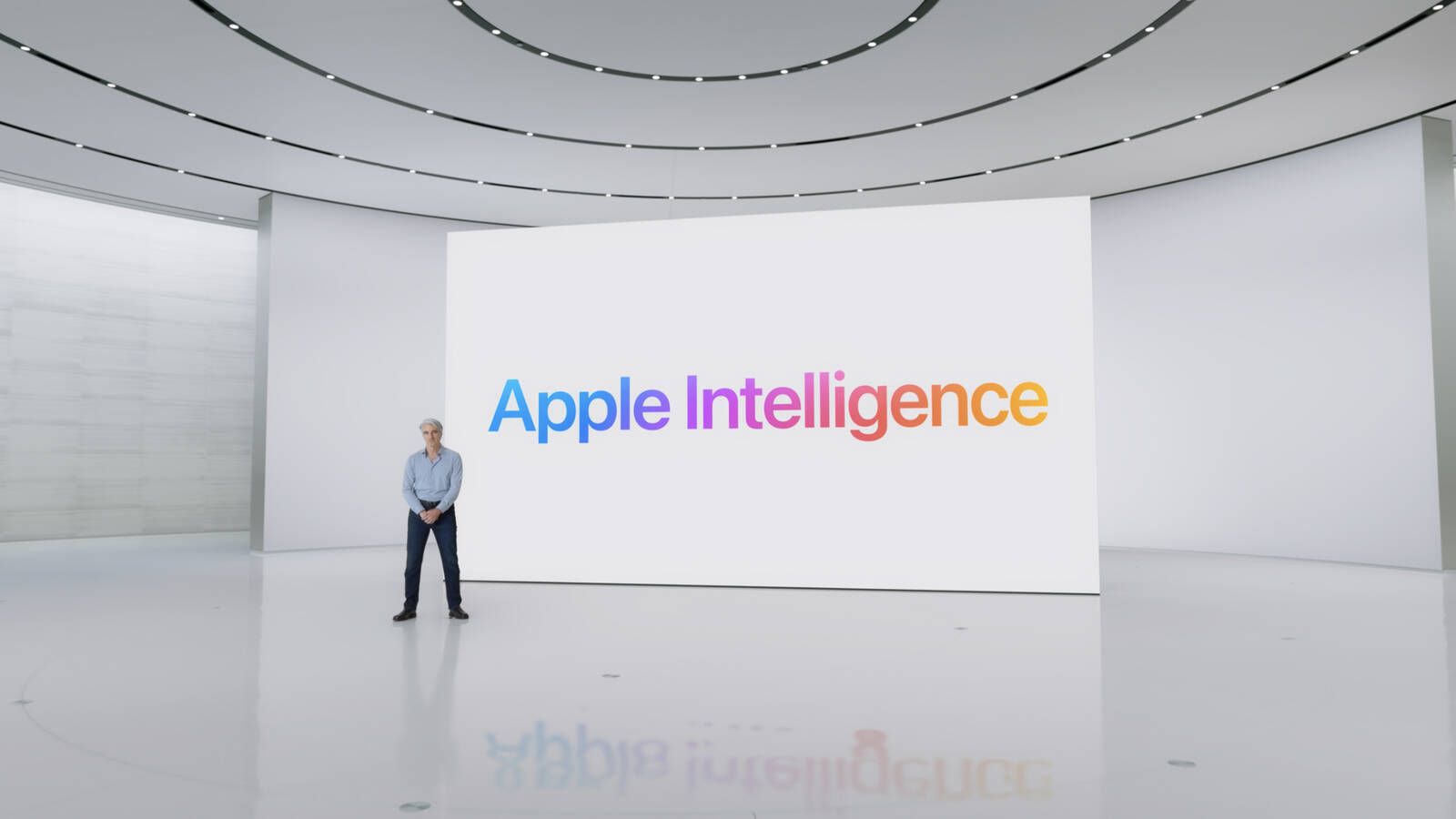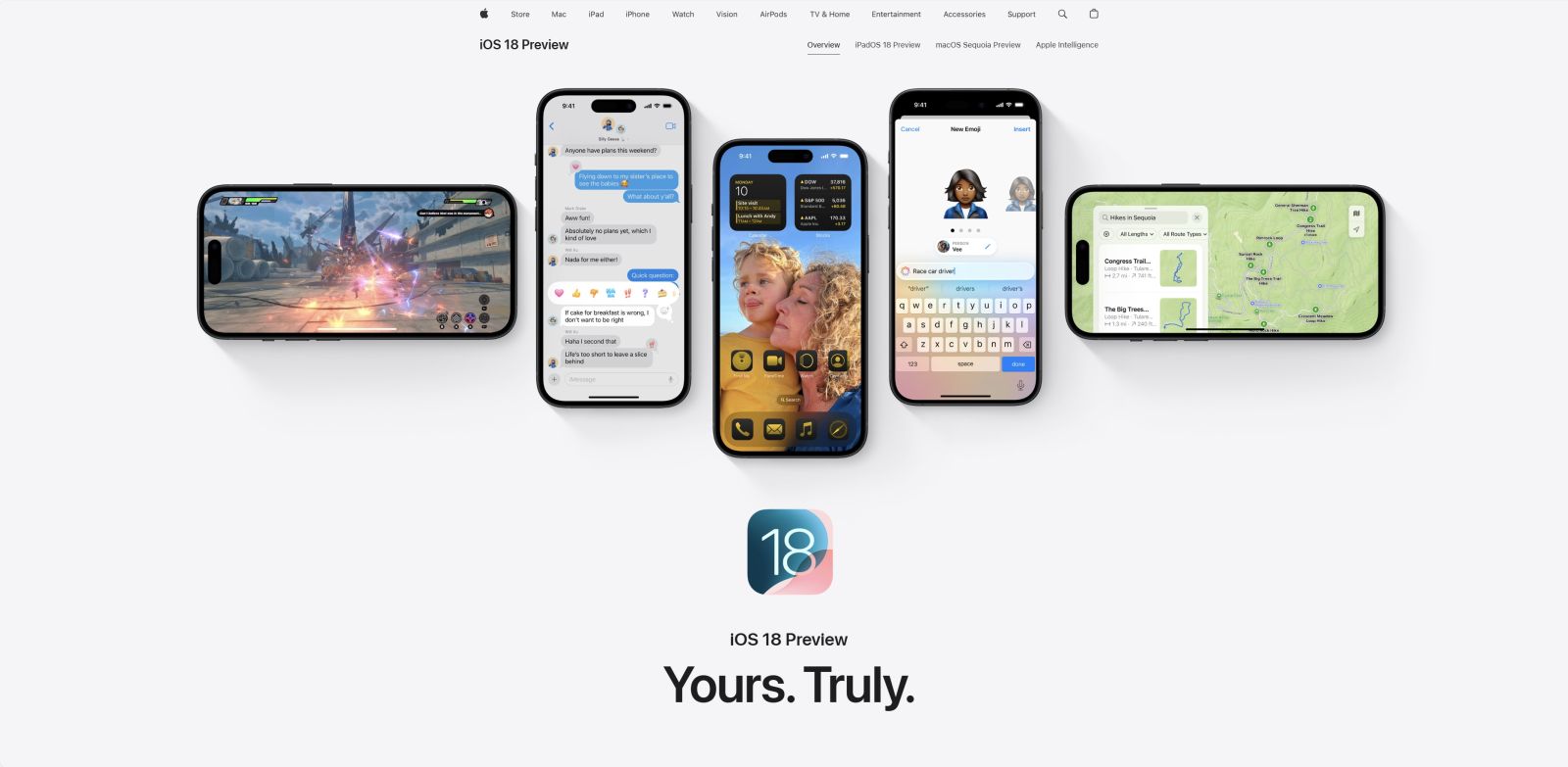iOS 18 Preview
Apple's next-generation operating system for iPhone and iPad, in developer beta now and launching in the fall 2024.

Unveiled at
WWDC 2024 in June, iOS 18 is the next-generation version of iOS, set to be released to the public in September. iOS 18 is built around Apple Intelligence, which is what Apple is calling its AI feature set that's deeply integrated into iOS. Apple Intelligence combines generative AI with personal context, and Apple calls it "AI for the rest of us."
Apple Intelligence improves writing across the operating system, makes Siri much smarter, and allows for multiple forms of content generation. A set of Writing Tools will be available across all apps for rewriting, polishing, proofreading, and summarizing text. You can change your tone, make your writing more concise, and ensure there are no spelling or grammar errors.
An
Image Playground app lets you generate images using prompts or Apple's suggestions and themes. You can incorporate pictures of your friends and family to make all kinds of fun custom photos in styles that include Animation, Illustration, or Sketch. Image Playground image generation is built into Messages, Notes, and other apps.
There's a
Genmoji feature in the Messages app that lets you create any emoji you want without being limited to the built-in options. You can enter a short description of what you want, even including your friends, and Apple will make it for you.
In the
Photos app, you can create custom Memories by typing in a description, with Apple Intelligence choosing appropriate photos and videos based on your description. Memories include a storyline, included music, and chapters for a full narrative arc. A Clean Up tool can be used when editing images to remove unwanted objects from the background of a photo.
Apple entirely overhauled
Siri with
Apple Intelligence, creating an assistant that is more contextually relevant, personal, and natural. You can use voice commands with Siri, but there's also a new type to Siri option you can activate with a double tap on the bottom of the display. Siri has more personal context for fulfilling requests, and can take actions in apps for the first time. Siri can edit photos, manage files, create folders, and tons more.
Siri better understands language, can keep track of what you asked in a prior request, and knows what's on your screen so you can ask about it.
Siri can search your entire device for information and knows your history, so it is prepared to help you with all your everyday tasks.
Apple gave Siri a new look, and when the personal assistant is activated, there's now a glowing ring around the display. Siri also has deep Apple product knowledge and can give you step-by-step instructions on whatever you need to do, so it's like having an
Apple Genius in your pocket. When Siri doesn't know something, there's an option to bring in OpenAI's
ChatGPT for your requests. ChatGPT is free, gets no info from you, and can be used for creating and illustrating content from scratch.
Apple Intelligence is limited to the iPhone 15 Pro models and iPads and Macs with an M-series chip, and that's because much of the processing is done on-device for privacy purposes and to keep user data safe. Apple cloud servers running on Apple silicon are used for more intensive tasks. Apple promises that its Private Cloud Compute feature does not store data or make it accessible to Apple in any way.

In addition to the
AI features, there are a ton of other additions that are not AI related and are available on a much wider range of iPhones. There are new customization options for the Home Screen, with the option to rearrange apps and widgets with open spaces and around wallpapers. Icons and widgets can be made larger and have a darker option for dark mode, plus there's an option to add a colored tint.
Apple redesigned
Control Center and made it so everything can be rearranged to put what you use most front and center, with customized sizes and groups. A controls gallery lets you add all kinds of new quick actions, including controls from third-party apps. Control Center can also be split into multiple screens, so you can have dedicated sections for HomeKit, media playback, connectivity, and more, with the option to swipe between them.
The
Flashlight and
Camera icons on the Lock Screen are part of the Control Center in
iOS 18 and can be swapped for other controls or removed entirely, plus controls can also be assigned to the Action button on the iPhone 15 Pro models.
Apple updated the
Photos app, merging the Library and For You tabs into a simplified view that focuses on surfacing your best photos and memories. With Collections, it's easy to find photos organized by themes like recent days, trips, and people and pets. Collections can be pinned for quick access to your most used content. There's a new carousel view that shows you highlights of your best content, and Live Photos and videos will autoplay as you browse.
The
Messages app supports scheduling texts for the first time, and the Tapback feature that you use to react to texts now supports any emoji. Text effects can be added to a word, phrase, or emoji, and formatting like bold and italic is available. iOS 18 will see Apple transition from SMS/MMS to Rich Communication Services or RCS for green bubble text, which will result in better messaging experiences with Android users.
If you don't have a cellular or a Wi-Fi connection, you can still text family and friends using Messages via
satellite on the iPhone 14 and later. It connects to nearby satellites and works with texts, emoji, and Tapbacks. You can text iPhone users with iMessage or Android users with SMS, but only iMessages are end-to-end encrypted.
Later in 2024, Mail will adopt on-device categorization with sections like promotions, transactions, and personal email, and there is a new digest view that aggregates all of the relevant emails from a business for a full look at correspondence.
There are
Highlights in Safari that surface key information about a webpage like a summary of an article, the location of a restaurant, or access to a map on a webpage for a shop. Reader mode has been upgraded with a summary and table of contents. The Notes app supports live audio recording and transcription, along with Math Notes that can automatically solve equations and expressions.
 Maps
Maps now includes topographic maps and trail networks, including detailed maps of all 63 U.S. national parks. Hikes can be saved for offline access, and you can create custom walking and hiking routes.
Apple added a
Game Mode that minimizes background activity to ensure all of your processing power goes to the game you're playing, plus it cuts down on latency from game controllers and AirPods, with AirPods also gaining support for Personalized Spatial Audio for gaming.
With a Tap to Cash feature, you can tap your iPhone to another iPhone to send money over
Apple Cash without having to share your phone number or other personal information. Apple Pay supports paying with rewards and with installment plans offered by some credit cards, plus event tickets have been redesigned in Wallet to include maps, information about the venue, and more.
The
Passwords section in Settings is now a whole Passwords app that stores iCloud Keychain logins and passwords. The Passwords app supports passkeys, Wi-Fi passwords, verification codes, and more. Passwords can be accessed on iPhone, iPad, Mac, and Windows PCs.
Apple improved privacy in iOS 18, and it's now possible to lock any app, requiring
Face ID or Touch ID to open it even when your iPhone is unlocked. You can also hide an app, which removes it from the Home Screen and tucks it away in a hidden folder in the App Library that can't be accessed without authentication. Apps that are locked or hidden won't send notifications and aren't available in search.
Apps that ask for contacts can now be granted access to just select contacts, hiding access to your full contact list. Apple has also added a new method for connecting third-party accessories without letting an app see other devices on the network.
AirPods Pro 2 in iOS 18 support a new gesture-based Siri response option, so you can shake your head for no or nod for yes. If you get a call, you can shake your head to decline, for example. Apple is also adding Voice Isolation so you can better tune out background noise.
iOS 18 is limited to developers right now, but Apple plans to expand it to public beta testers in July. The software will see a public launch in the fall.
iOS 18 Preview - Apple



